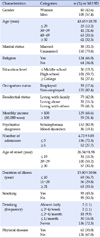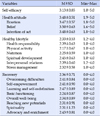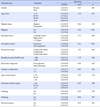1. Lee C. 2017 National mental health status 3rd preliminary report. National mental health statistics pilot study. Seoul: National Center for Mental Health;2017. 12. Report No. 979-11-86322-51-2.
2. Organization for Economic Co-operation and Development. Health care utilisation: hospital average length of stay by diagnostic categories [Internet]. 2017. cited 2018 July 19. Available from:
https://stats.oecd.org/index.aspx?queryid=30165.
3. Jeon JA, Lee NH, Kim JH. Recent changes in mental health policy in Korea. Health and Welfare Policy Forum. 2017; 246:51–63.
4. Davidson L, Schmutte T, Dinzeo T, Andres-Hyman R. Remission and recovery in schizophrenia: practitioner and patient perspectives. Schizophrenia Bulletin. 2008; 34(1):5–8. DOI:
10.1093/schbul/sbm122.

5. Kim MY. A study of quality of life based on the recovery among people with mental illness. Mental Health and Social Work. 2011; 38:205–236.
6. Whitley R, Drake RE. Recovery: a dimensional approach. Psychiatric Services. 2010; 61(12):1248–1250. DOI:
10.1176/ps.2010.61.12.1248.

7. Gordon SE, Ellis PM, Siegert RJ, Walkey FH. Core dimensions of recovery: a psychometric analysis. Administration and Policy in Mental Health and Mental Health Services Research. 2014; 41(4):535–542. DOI:
10.1007/s10488-013-0489-1.

8. Keum R, Kim SA. Perceived functional health patterns and recovery in people with schizophrenia spectrum disorders. Journal of Korean Academy of Psychiatric and Mental Health Nursing. 2012; 21(3):238–249. DOI:
10.12934/jkpmhn.2012.21.3.238.

9. Derya KE, Neslihan PG. Determination of physical health status and healthy lifestyle behaviors of individuals with mental illness. Perspectives in Psychiatric Care. 2018; 54(3):371–379. DOI:
10.1111/ppc.12261.

10. White J, Gray R, Jones M. The development of the serious mental illness physical health improvement profile. Journal of Psychiatric and Mental Health Nursing. 2009; 16(5):493–498. DOI:
10.1111/j.1365-2850.2009.01375.x.

11. Kim HR. The effects of the factors influencing the physical health behaviors on people with mental illness based on the theory of triadic influence [dissertation]. [Seoul]: Ewha Womans University;2016. 142.
12. Torabi MR, Jeng I. Health attitude scale construction: importance of psychometric evidence. American Journal of Health Behavior. 2001; 25(3):290–298. DOI:
10.5993/AJHB.25.3.17.

13. Kang SI. A Study on the levels of recovery attitudes and factors affecting the recovery attitude of the chronically mentally ill living in the institutions. Health and Social Science. 2011; 30:97–129.
14. Thomas EC, Muralidharan A, Medoff D, Drapalski AL. Self-efficacy as a mediator of the relationship between social support and recovery in serious mental illness. Psychiatric Rehabilitation Journal. 2016; 39(4):352–360. DOI:
10.1037/prj0000199.

15. Zechner MR, Gill KJ. Predictors of physical activity in persons with mental illness: testing a social cognitive model. Psychiatric Rehabilitation Journal. 2016; 39(4):321–327. DOI:
10.1037/prj0000191.

16. Song GO. Validation of the Korean version of the mental health recovery measure. Mental Health and Social Work. 2010; 34:154–188.
17. Oh IS. General self-efficacy: the concept, measurement issues, and implications for HRM. Korean Journal of Industrial and Organizational Psychology. 2002; 15(3):49–72.
18. Kim JH, Yun SN. Occupational stress of the workers in a electronic manufacturing factory. Journal of Korean Community Nursing. 2001; 12(1):239–246.
19. Ahn HC, Kim MA. Effects of self-determination on recovery of persons with mental illness living in mental health care facilities: the moderating effect of social support. Mental Health and Social Work. 2017; 45(4):53–82. DOI:
10.24301/MHSW.2017.12.45.4.53.

20. Bae EK, An HJ. The influences of recovery on mentally disabled persons' behavior and symptom in the community. Journal of Social Science. 2016; 42(1):231–251.

21. Kim DY. A study on the factors affecting the recovery of persons with mental illness [master's thesis]. [Gwangju]: Honam University;2016. 78.
22. Park YM, Shin G, Kim J. Factors influencing health-promoting behaviors in people living with HIV. Korean Journal of Adult Nursing. 2014; 26(2):234–243. DOI:
10.7475/kjan.2014.26.2.234.

23. Küçükberber N, Ozdilli K, Yorulmaz H. Evaluation of factors affecting healthy life style behaviors and quality of life in patients with heart disease. The Anatolian Journal of Cardiology. 2011; 11(7):619–626. DOI:
10.5152/akd.2011.166.
24. Kumsar AK, Pakyuz SC. Determining the healthy lifestyle behaviors and related factors on women with metabolic syndrome. Journal of Education and Research in Nursing. 2015; 12(1):19–24. DOI:
10.5222/HEAD.2015.019.
25. Yun DH. The elders attitude for their health and the mediated effect in social capital related to health-enhancement relationship [dissertation]. [Gwangju]: Chosun University;2017. 87.
26. Kang JS, Kang HS, Jeong YH. A web-based health promotion program for patients with metabolic syndrome. Asian Nursing Research. 2014; 8(1):82–89. DOI:
10.1016/j.anr.2014.03.002.

27. Kim MG. A study on the effects of empowering social interaction on social behaviors of people with psychiatric disability. Mental Health and Social Work. 2009; 33:5–35.




 PDF
PDF ePub
ePub Citation
Citation Print
Print








 XML Download
XML Download